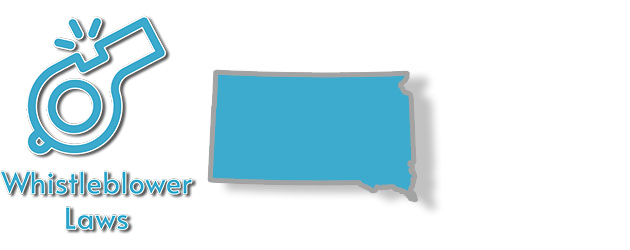
A Summary of South Dakota Whistleblower Laws
South Dakota is an employment-at-will state. This means employees can be discharged from work for any reason or no reason. However, there are a few exceptions to this doctrine that are used to protect employees from wrongful retaliation. These exceptions include common law protections and statutory protections. Statutory protections are laws that are enacted by the state’s legislature to address specific subject areas, e.g., workers’ compensation, whereas common law protections are laws that are created by courts to address subject areas that are not covered by enacted laws.
This is a summary of South Dakota Whistleblower Laws, make sure to check out the Federal Whistleblower Laws as well.
Whistleblower Rights in South Dakota
Common Law Protections for Whistleblowers in South Dakota
South Dakota has a public policy that is applied as an exception to the employment-at-will doctrine. Therefore, it is illegal for employers to discharge an employee for reasons that violate public policy. To determine whether an employee is eligible for protection under the state’s public policy, the courts usually rely on statutory protections, constitutional provisions, and prior judicial opinions. For example, if a statute endorses a worker’s right to collect a wage not less than the minimum wage, an employer who discharges an employee in retaliation for exercising such a right may be found guilty of violating public policy. Generally, South Dakota protects employees who engage in the following activities from wrongful discharge:
- Refusing to participate in illegal activities.
- Filing a workers’ compensation claim.
- Reporting unlawful conduct to the appropriate authority.
Statutory Protections for Whistleblowers in South Dakota
Public Employees
It is against the law to retaliate against a public employee for:
- Reporting a violation of state law to the attorney general’s office, the State Government Accountability Board, or the appropriate personnel in the employee’s workplace.
- Filing a suggestion under this statute.
Wage Discrimination
Employers are not allowed to terminate, threaten, or in any way retaliate against an employee for:
- Filing a charge under this statute.
- Testifying against the employer in an action brought under sex discrimination in wages law.
- Giving information against the employer in an action brought under sex discrimination in wages law.
S.D. Codified Laws § 60-12-21.
Abortion
No agency or institution is allowed to retaliate against an employee for:
- Advising or helping an individual to arrange for an abortion.
- Refusing to arrange or encourage abortion.
This statute applies to counselors, social workers, or persons who may be in a position where an abortion question may arise as part of their workday routine. S.D. Codified Laws § 34-23A-11.
Abuse and Neglect of Disabled Persons
No agency, community service provider, facility, or school is allowed to retaliate against an employee for reporting in good faith suspected abuse, neglect, or exploitation of a person with a developmental disability. S.D. Codified Laws § 27B-8-43.
Discrimination
It is against the law for anyone to threaten or in any way discriminate against another person in retaliation for:
- Filing a charge under this statute.
- Testifying or assisting in the enforcement of provisions under this statute.
Under this statute, employers are not allowed to discriminate against their employees on the basis of race, color, creed, religion, sex, ancestry, disability, or national origin. S.D. Codified Laws § 20-13-26.
Wages
Employers are not allowed to discharge, threaten, or in any way discriminate against an employee in retaliation for:
- Filing a complaint concerning unpaid wages with the employer or the Department of Labor and Regulation.
- Filing a complaint under this statute.
- Intending to institute a proceeding under this statute.
- Testifying or intending to testify in a proceeding under this statute.
S.D. Codified Laws § 60-11-17.1.
Whistleblower Retaliation Claims in South Dakota
Unless stated otherwise by a statute, retaliation lawsuits should be filed within 3 years of the retaliatory action.
Discrimination
Complaints under this statute should be filed with the South Dakota Department of Labor and Regulation, Division of Human Rights within 180 days of the retaliatory action. Complainants can also choose to file a lawsuit. The lawsuit must be filed within 1 year of the retaliatory action, however, the complainant must still request the department for permission to proceed with the lawsuit.
Whistleblower Hotlines in South Dakota
To file a complaint with the South Dakota Department of Labor and Regulation, Division of Human Rights, call 605.773.3681.
Whistleblower Retaliation and Violation Penalties in South Dakota
In case a person is found guilty of carrying out unlawful retaliation against an individual, he or she may be liable to the aggrieved individual for a combination or any of the following relief:
- Reinstatement.
- Lost wages.
- Actual damages.
- Litigation costs.
- Plus any other relief deemed appropriate by a court.
Wages
Employers who violate this statute by failing to pay an employee his or her wages may be liable to the aggrieved employee for:
- Unpaid wages.
- Liquidated damages.
- Litigation costs, including reasonable attorney’s fees.
More South Dakota Laws